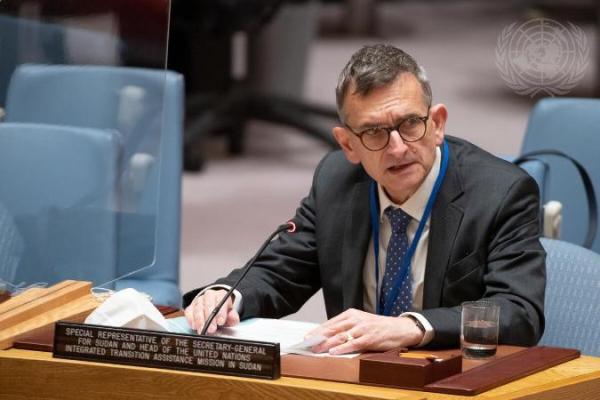Volker says encouraged by commonality of constitutional initiatives over transition in Sudan
September 13, 2022 (KHARTOUM) – UN Special Representative and UNITAMS Head Volker Perthes said that Sudanese initiatives to end the political stalemate disagree on the role of the military component in the transition but considerably agree on the remaining issues.
Volker Perthes, UN representative and UNITAMS head, on September 13, briefed the Security Council on development in Sudan during the last 90 days from 6 May to 20 August.
Perthes told the 15-member body that the overall situation would continue to worsen if no political situation is found. However, he voiced some optimism when he invoked the various initiatives made by the Sudanese political and social forces to settle the political crisis.
“I am actually encouraged by the degree of commonality in the current debate in Sudan. There are important differences, no doubt, about the institutional division of powers, particularly the role of the military,” he said.
After what, he underscored that there is a “wide-ranging consensus” on the need for a civilian head of state, an independent prime minister, and a cabinet of technocrats.
” So, there is an opportunity to end the crisis, which military and civilian forces need to grasp,” he stressed.
In his briefing, the UNITAMS head mentioned the draft constitutional framework of the Sudanese Bar Association and stressed that it was endorsed by the parties behind two other major initiatives.
This “Means that the Bar Association initiative now gathers a broad spectrum of civilian forces around one vision, including the parties of the Forces for Freedom and Change (…), relevant parties not included in that government like the Democratic Unionist Party, and Juba Peace Agreement signatories still present in today’s Sovereign Council,” he said.
The Sudanese lawyers call for a very limited role for the military component restricted to the defence and security of the country in a council to be chaired by a civilian.
Volker also pointed to the return of the elements of the former regime in the government institutions and some 20 charity groups linked to the former ruling party and its dignitaries after their dissolution by the civilian government.
On October 25, 2021, the Sudanese military overthrew the civilian transitional government with the political support of two Darfur former rebel groups after demands by the FFC groups to control the army’s economic activities and rotate the sovereign council chairmanship as agreed.
Speaking via videoconference from Khartoum, Ibrahim Mudawi, President of the Sudan Social Development Organization, a group that mainly supported the IDPs in Darfur called for integrating the signatory groups into the national army instead of “roaming amongst civilians”.
He underscored that there is a risk of inter-factional fighting that might lead to a civil war if the security arrangements of the Juba peace agreement are not implemented.
For his part, Sudan’s Ambassador to the United Nation, Al-Harith Idriss echoed the statements of the military leaders in Khartoum about the UNITAMS role.
Idriss called on the international community to support the implementation of the peace agreement and stressed that UNITAMS has a role to play in this regard.
“Rather than simply saying implementation of the Agreement has been slow, the Mission should consider what it has done to implement the Agreement at the desired pace,” he said.
Also, he blamed the Secretary-General’s quarterly report for failing to mention Government efforts to promote and protect human rights through its cooperation with international human-rights mechanisms but he did not stop at bloody violence against peaceful protesters.
(ST)

